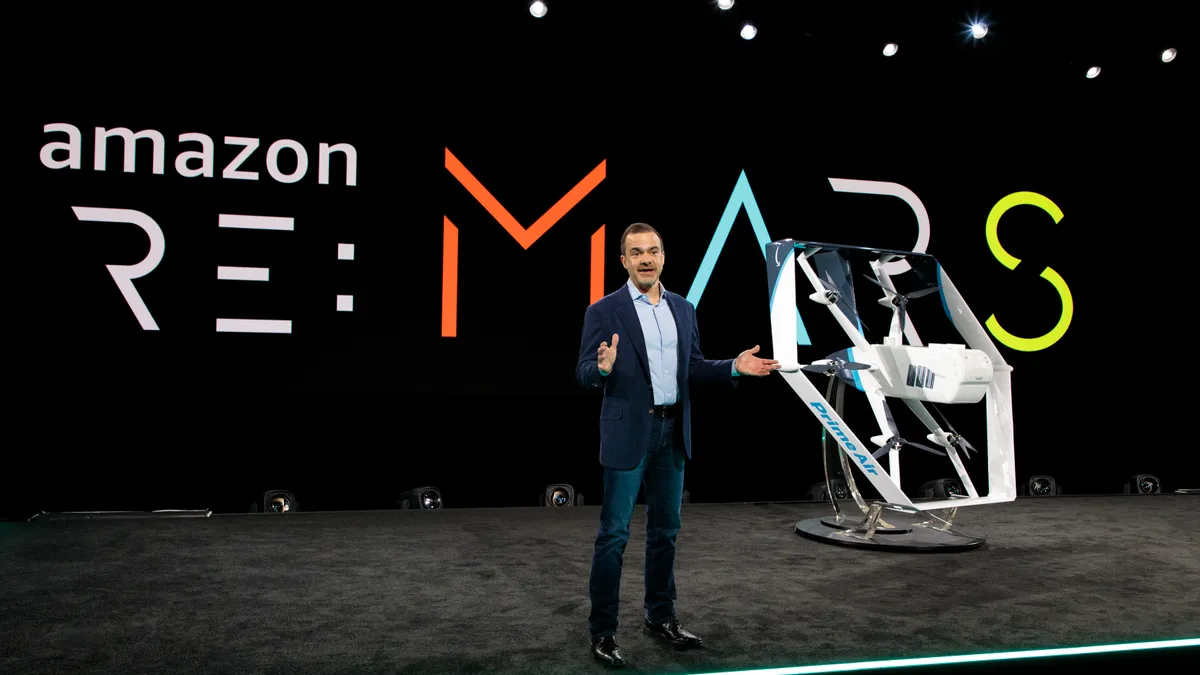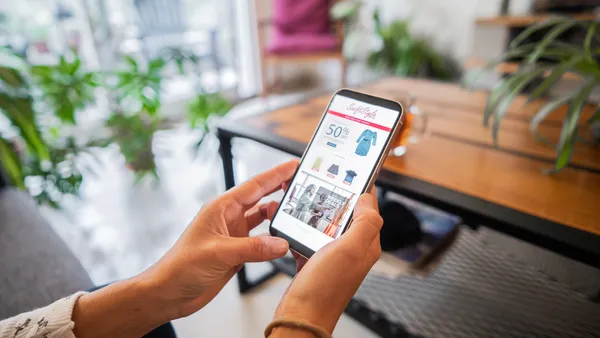Dive Brief:
- The Federal Aviation Administration has granted Amazon Prime Air a Part 135 exemption in the form of a standard operating certificate, which allows the company to begin drone delivery within a test range, according to documents from the agency and confirmation from the retailer.
- Amazon said it estimated the test would initially involve 10 houses, according to the exemption. It did not provide details on where these homes would be located. Prime Air has development centers in the United States, the United Kingdom, Austria, France and Israel, a spokesperson said when asked about the test range location. Amazon told the FAA it would just carry 5-pound payloads, and said drones will be important in realizing 30-minute delivery.
- The exemption specifically covers the MK27 drone, the Amazon-manufactured drone that was unveiled at re:MARS in August 2019. "Amazon envisions that the MK27 would be capable of delivering up to 85% of the products Amazon sells to a variety of customer locations and designated drop-off points," the exemption reads. The certificate of authorization specifically limits the operation to a test range, and if Amazon wants to expand its operation, it will need to go through the process of amending the approval or get an entirely new one, according to the FAA.
Dive Insight:
Over the last few years, drone delivery has grown from an unproven idea into a fully functional business model, albeit with limited applications. UPS was granted FAA approval to carry out commercial drone deliveries last year, and its Flight Forward arm has since begun working with hospitals on implementing drone applications.
Amazon applied for its FAA exemption last year, and the company's Worldwide Consumer CEO Jeff Wilke told the re:MARS conference Amazon would be able to start drone delivery "within months." But Amazon has been part of the drone delivery conversation since the early days, with CEO Jeff Bezos outlining the idea seven years ago on 60 Minutes.
"The reason why Amazon and others are pushing for drone-based delivery services is twofold," said Matthias Winkenbach, director of Massachusetts Institute of Technology's Megacity Logistics Lab. "One, it provides speed, and two, it can provide efficiency."
Dealing with the promise of same-day delivery is fairly difficult when all of the deliveries are made with the traditional van. Vans are filled in the morning, which means companies have to provide a cutoff time for same-day delivery. Drones would allow firms to accept orders later in the afternoon, Winkenbach said.
The exact location of the test range was not disclosed by either Amazon or the FAA. The agency only described the environment as "highly rural," and said operations would not take place over people. Rural areas have long been seen as a potential primary beneficiary of drone delivery, given that last-mile logistics is more expensive, according to a 2016 report by McKinsey and Company.
"So, if you can take that [delivery] out of the conventional vehicle route and serve it by drone instead, then you save a lot of money on the conventional vehicle routes, because then it is less constrained now and has to make fewer detours," Winkenbach said. "And then you can still serve the customer through his or her full satisfaction with the drone."
With fewer people and less ground infrastructure, rural areas are less risky for testing drones. That makes it easier to get regulatory approval, Winkenbach said.
Another use-case for drones would be to use a larger drone to shuttle multiple packages between a company's facilities.
"These kinds of middle-mile applications, I think, are very interesting and are usually neglected in the public perception," Winkenbach said. "They're much more realistic to actually get operational and approved and authorized over the next couple of years, because you're controlling both the origin of the drone flight and the destination,"
It is likely drone delivery will eventually become part of daily life in some form, with UPS and Amazon, two of the largest logistics operations in the country, now working on the technology, Winkenbach said.
"I think with Amazon and UPS both moving very boldly into this direction, it should be clear now to the entire industry ... that this is actually an area of high economic potential," he said.












